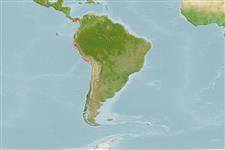>
Eupercaria/misc (Various families in series Eupercaria) >
Sciaenidae (Drums or croakers)
Etymology: Paralonchurus: Greek, para = the side of + Greek, logchos = lance + Greek, oura = tail (Ref. 45335).
More on author: Steindachner.
Environment: milieu / climate zone / depth range / distribution range
Ekologi
laut dasar (demersal); kisaran kedalaman 10 - ? m. Tropical; 9°N - 20°S, 82°W - 70°W (Ref. 112843)
Eastern Pacific: Panama to northern Chile.
Length at first maturity / Size / Weight / umur
Maturity: Lm ?, range 24 - ? cm
Max length : 51.0 cm TL jantan/; (Ref. 55763); common length : 30.0 cm TL jantan/; (Ref. 55763)
deskripsi pendek
Kunci identifiaksi (pengenalan) | Morfologi | Morfometrik
Body elongate, moderately compressed, with an arched dorsal profile; snout prominent; mouth small and inferior; lower jaw enclosed by upper; chin with 5 pores and 12 to 15 pairs of small barbels; edge of preopercle smooth; lower branch of first gill arch with 10 to 14 gill rakers; body uniformly dark and silvery; flanks with 7 or 8 indistinct bars; fins dark (Ref. 55763).
Found along sandy coasts and in bays (Ref. 9118). Feeds mainly on worms and other benthic invertebrates (Ref. 9118). Common in local markets (Ref. 9118).
Chao, L.N., 1995. Sciaenidae. Corvinas, barbiches, bombaches, corvinatas, corvinetas, corvinillas, lambes, pescadillas, roncachos, verrugatos. p. 1427-1518. In W. Fischer, F. Krupp, W. Schneider, C. Sommer, K.E. Carpenter and V. Niem (eds.) Guia FAO para identificacion de especies para los fines de la pesca. Pacifico Centro-oriental. 3 volumes. 1813 p. (Ref. 9118)
Status IUCN Red List (Ref. 130435: Version 2024-1)
ancaman kepada manusia
Harmless
penggunaan manusia
Perikanan: komersial; Akuarium: Komersial
Alat, peralatan
laporan khas
muat turun XML
Sumber internet
Estimates based on models
Preferred temperature (Ref.
123201): 17 - 22.8, mean 20.4 °C (based on 14 cells).
Phylogenetic diversity index (Ref.
82804): PD
50 = 0.5156 [Uniqueness, from 0.5 = low to 2.0 = high].
Bayesian length-weight: a=0.00759 (0.00472 - 0.01218), b=3.11 (2.98 - 3.24), in cm total length, based on LWR estimates for this species & (Sub)family-body (Ref.
93245).
Trophic level (Ref.
69278): 2.2 ±0.1 se; based on diet studies.
Daya lenting (Ref.
120179): sedang, Waktu penggandaan populasi minimum 1.4 - 4.4 tahun (Assuming tm=2).
Fishing Vulnerability (Ref.
59153): Moderate vulnerability (40 of 100).
Climate Vulnerability (Ref.
125649): Very high vulnerability (80 of 100).
Nutrients (Ref.
124155): Calcium = 134 [77, 299] mg/100g; Iron = 1.13 [0.57, 2.08] mg/100g; Protein = 18.4 [17.1, 19.6] %; Omega3 = 0.175 [0.089, 0.309] g/100g; Selenium = 60 [31, 128] μg/100g; VitaminA = 14 [4, 47] μg/100g; Zinc = 1.42 [0.99, 2.12] mg/100g (wet weight);
